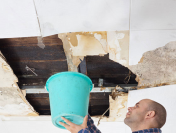 “Snowbirds†preparing to head north to avoid Florida’s brutal summer heat will want to safeguard their winter residences before taking off.  The state’s near-tropical summer climate makes humidity control, flood protection and mold and mildew prevention three areas of concern for every snowbird. If you are a part-time Floridian, here are some important home closing procedures to help you protect your property.
“Snowbirds†preparing to head north to avoid Florida’s brutal summer heat will want to safeguard their winter residences before taking off.  The state’s near-tropical summer climate makes humidity control, flood protection and mold and mildew prevention three areas of concern for every snowbird. If you are a part-time Floridian, here are some important home closing procedures to help you protect your property.
Humidity
Summer in Florida means oppressive heat and very high levels of humidity.  Nearly everything in your Florida home is vulnerable to the effects of high humidity, which causes: rusting appliances; mold and mildew growth; corrosion to electronic equipment and computers; deterioration to wood, cotton and leather; warping of woodwork; musty odors; insect infestation; and flaking paint and peeling wallpaper.
HUMIDITY MANAGEMENT: Normal humidity levels are between 30 and 50 percent. You can control humidity levels in your home and inhibit the growth of mold and mildew by blocking outside moisture and minimizing indoor moisture by:
- Weathersealing doors and windows
- Covering kitchen and bath vents with plastic
- Closing fireplace dampers
- Running the air conditioning for a couple of hours a day (note that this is the MOST important thing you can do!).
OPTIMIZE A/C PERFORMANCE: Have your air conditioning system inspected and cleaned by a professional a week or two before you depart. Program the A/C to run in the cool morning hours for about two hours beginning at 3:00 or 4:00 a.m. Use timers to operate individual room air conditioning units. If your home has central air conditioning, use a programmable thermostat.  Be sure to set thermostats low enough to so the A/C runs continually during the two-hour period.
REMOTE MONITORING: To check the temperature and humidity levels in your Florida residence while you are away, consider installing a remote thermostat control.  These nifty devices allow you to monitor your home’s “vitals†via phone or Internet (depending upon your communications capabilities) and make temperature adjustments from afar. They also send out automatic alerts to your phone or email address if the inside temperature gets too high or too low, based on your set points. Two popular systems are the Sensaphone 400 and the BAYweb Internet Thermostat Advanced which communicate via phone or Internet, respectively.
Flooding & Leaks
In addition to keeping humidity out of your Florida home, you’ll want to prevent unwanted water from seeping in.  That moist, salty sea air wreaks havoc on appliances and electronics. Remember too that hurricane season hits in the summer and fall, bringing torrential rain and high winds, along with the risk of leaks and flooding.
CHECKLIST TO PROTECT AGAINST WATER DAMAGE:
- Inspect windows and doors — fill in gaps and cracks with caulking
- Check flashing around chimneys and vents for damage
- Clean out gutters and downspouts and repair if damaged
- Remove debris from roof so rain will run off quickly
- Turn off the water to the washing machine and the hot water heater
- Turn off the water at the emergency cut-off valve outside the home
REMOTE MONITORING: A strategically-placed water sensor hooked up to either the Sensaphone 400 or BAYweb remote monitoring systems will alert you by phone or email if there is a water leak in your home. Water sensors can be situated anywhere prone to flooding and leaks – in the basement or crawlspace, by doors and windows, and under appliances like the washing machine and dishwasher. Another flood-risk location is the condensate pan in your A/C unit which can clog and overflow. A simple float switch (like the SumpBobber) connected to your Sensaphone 400 or BAYweb can be used to monitor that situation. Install a second float switch in the sump pump pit in your basement to warn of a failure there.
Mold and Mildew
Florida’s warm, humid weather creates the perfect environment for mold, mildew and bacteria to grow. Since pests and organisms attack organic materials, it is important to do a thorough job cleaning, vacuuming and disinfecting your home before you vacate.
CLEANING CHECKLIST:
- In the kitchen, clean kitchen appliances, cabinets and countertops with sudsy water and dry all surfaces.
- Dispose of fresh or perishable foods, including cereals, crackers and pasta
- Clean out refrigerators and freezers and toss opened condiments
- If you unplug the refrigerator, be sure to leave door propped open
- Clean dishwasher interior and filter and leave door open
- Thoroughly clean bathroom fixtures and all surfaces and wash all bath towels
- Remove any plastic wrappings or bags around clothing
- Run air conditioning for two hours a day, as discussed previously.
Following these steps should help ensure that your Florida residence will be clean and beautiful when you return in the fall. For additional information on closing your Florida home, see: http://www.p2pays.org/ref/08/07673.pdf.




Pingback: How to Control Summer Home Humidity with a PC or Smartphone
Mary Johansen
What temp should you set your AC at?
Ed holleman
Why run the air conditioner for 2 hours in middle of night when it is cool, wouldn’t 2 hours midday or midnaft be more effective. Or is it because power may be cheaper on off peak times?
Thanks in advance,
Ed